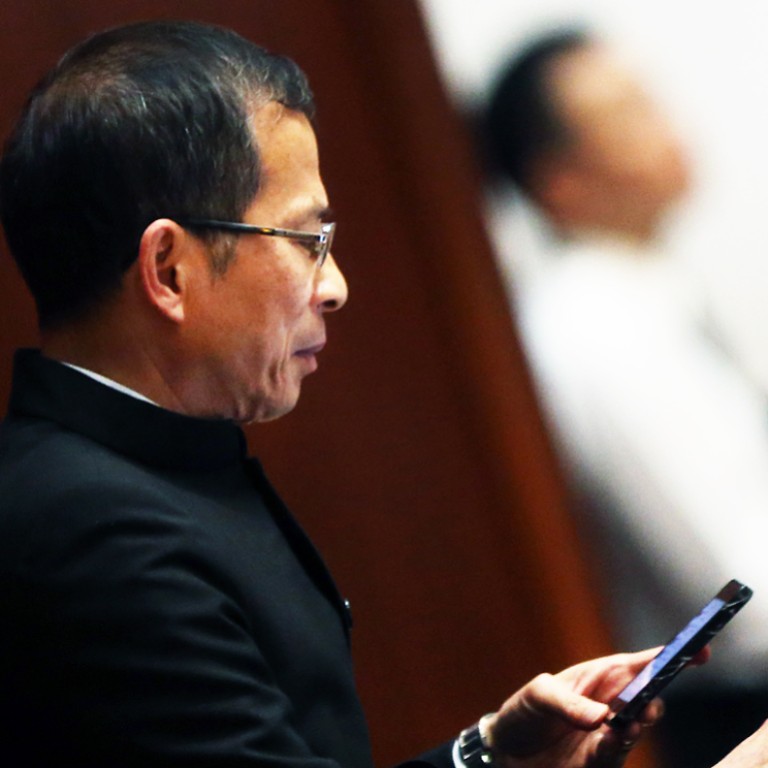
Legco president Jasper Tsang refuses to quit as leaked reform vote WhatsApp chat emerges
Revelation that Legco chief discussed strategy during historic vote in WhatsApp texts heaps more embarrassment on pro-Beijing lawmakers
A new bout of bitter infighting among Hong Kong's pro-establishment lawmakers left their camp in shambles yesterday over leaked WhatsApp messages involving the legislature's president during last week's historic electoral reform vote.
The disarray came despite Beijing's recent push to stop the bickering and ensure they present a united front against a resurgent pan-democratic camp, which not only succeeded in blocking the passage of the electoral blueprint but was boosted by a bungled walkout by their pro-establishment rivals.
And the news broke hours ahead of last night's crunch meeting between pro-establishment lawmakers and liaison office officials, widely seen as a post-mortem on the reform vote.
The cause of the latest friction is a series of WhatsApp messages first published yesterday by the Chinese-language newspaper and later confirmed by pro-establishment lawmakers, showing Legco President Jasper Tsang Yok-sing discussing strategy with the government's allies in the chamber last Thursday.
The exposé sparked a witch-hunt within the camp for the whistleblower, who is believed to have spilled the beans to prove members were not properly informed about the need to wait for rural kingpin Lau Wong-fat to arrive at Legco to cast his vote - the reason cited by those who led the walkout. The text messages made no mention of Lau.
The controversy also gave the pan-democrats ammunition to question Tsang's neutrality in the chamber, seeing the text messages as "clear evidence" that he was colluding with the rest of the government's allies.
The veteran Beijing loyalist, from the Democratic Alliance for the Betterment and Progress of Hong Kong, yesterday rejected their demands he quit as they mulled a no-confidence vote.
"It is up to lawmakers' views if I have to resign [after the no-confidence vote]," Tsang said. "I believe I have not done anything at all that would compromise my integrity or neutrality."
The messages suggested pro-establishment lawmakers delay their speeches that morning to prevent pan-democrats from controlling the timing of the crucial vote on reform.
"Not sure what they [pan-democrats] are planning to do. Need to watch out and the top priority is to hold back your speeches," one message from Tsang read. He said he had also heard most pan-democrats "don't want to take part" in an adjournment motion that would have dragged the debate into the next day.
People Power lawmaker Raymond Chan Chi-chuen made an analogy to a soccer game, saying Tsang was supposed to be the referee but had shown he was also coach of the pro-establishment camp. Chan's group will decide whether to submit a draft motion for a no-confidence vote by tomorrow, while 23 pan-democrats have already issued an open letter demanding a full apology and explanation from Tsang.
Tsang insisted he had only been trying to ensure the voting would take place at an "appropriate time" to avoid the risk of violent protests outside the legislature at night. He apologised to his allies - for causing them trouble by joining the chat group - and to pan-democrats for revealing their plans to their rivals.
Last Thursday's catastrophic walkout, led by business-sector legislator Jeffrey Lam Kin-fung and the DAB's Ip Kwok-him, happened seconds before the vote on the Beijing-decreed blueprint for the 2017 chief executive election, and led to only eight pro-establishment lawmakers casting supporting votes.
Former Legco president Andrew Wong Wang-fat said Tsang "should apologise to all Hongkongers" for failing to act impartially. Political scientist Dr Ma Ngok said the issue would severely undermine trust within the camp ahead of key elections.
But the Liberal Party's James Tien Pei-chun slammed the whistleblowers as "not having morality and integrity".
At midnight, published further messages, this time between local National People's Congress deputies. In a chat about 10 minutes after the vote, the deputies appear furious and perplexed, with one branding the lawmakers "rubbish".








